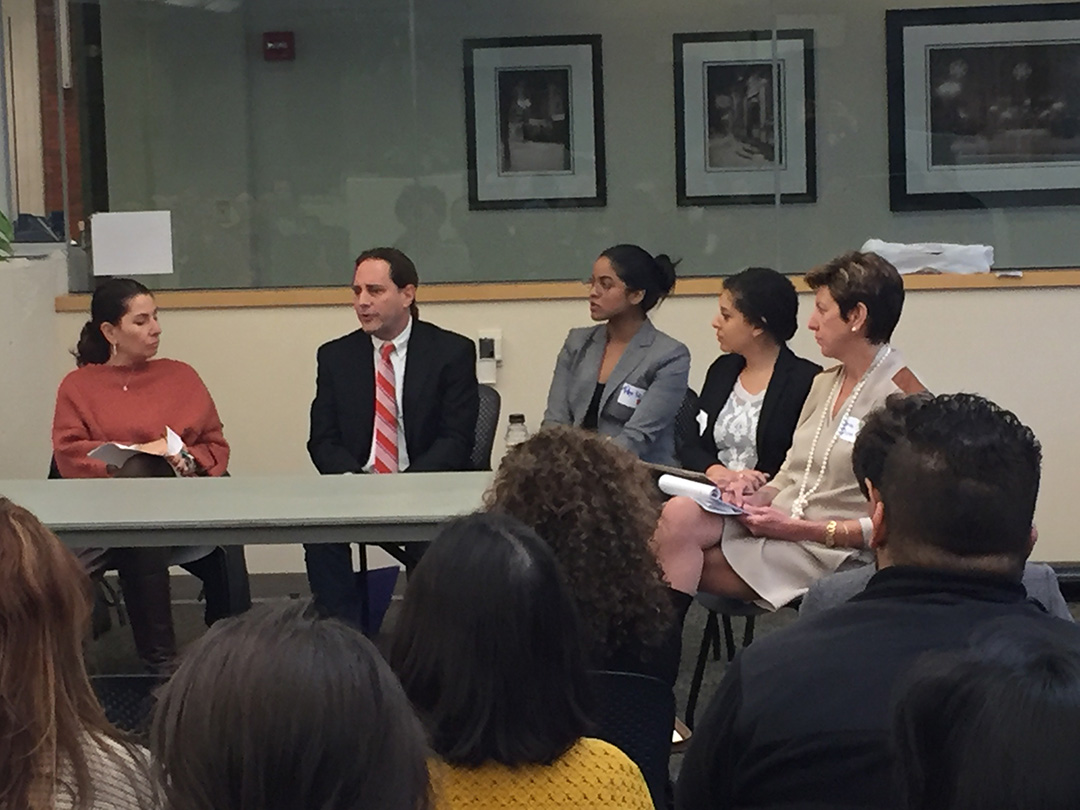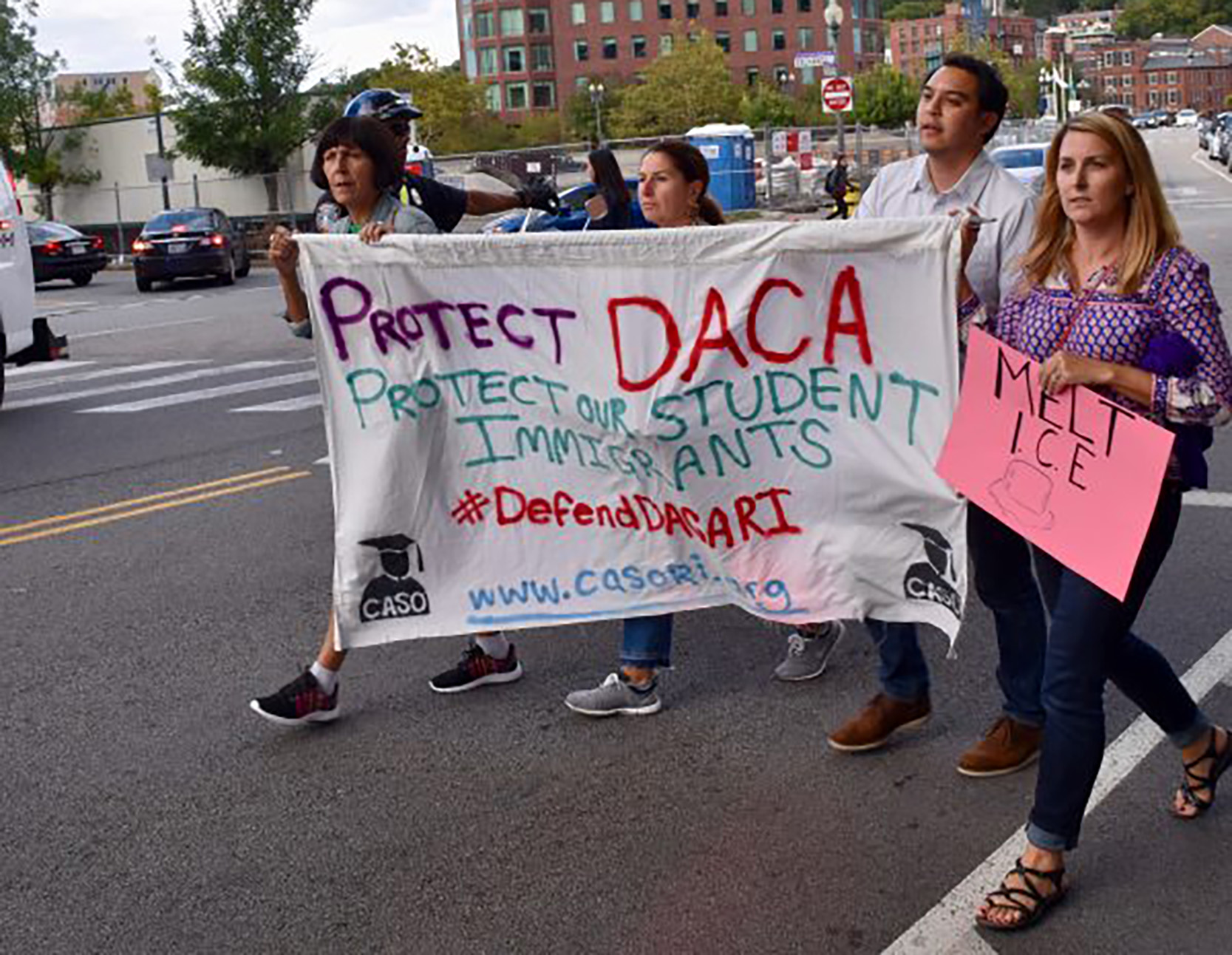Direct Action for Childhood Arrivals (DACA)
On September 5, 2017 President Trump chose to rescind Deferred Action for Childhood Arrivals or DACA, a two-year, renewable program that allowed for certain undocumented Americans to have their deportations delayed and obtain a temporary work permit after meeting specific qualifications, paying a $495 fee, submitting their biometrics, and undergoing a background check.
Further Attorney General Jeff Sessions announced, on behalf of the President Trump’s Administration, that DACA will be terminated in six months (by March 5, 2018), meaning 800,000 current DACA recipients will be forced out of their jobs and put them under threat of deportation, unless Congress acts. It is also possible that some states could still sue before this timeline, meaning DACA recipients are under imminent threat.
DHS issued the following memo, outlining the process by which DACA will be repealed:
• No new initial applications will be accepted after today, September 5.
• Anyone whose work permit expires on March 6, 2017 or later will lose their work permit and will be subject to immediate deportation.
• Individuals whose work permit expires on or before March 5, 2018 may apply for renewal of their work permit by submitting an application by October 5, 2017.
Further, DHS has said that they won’t “proactively” share information about DACA recipients between USCIS and ICE, BUT they can do so if the information provided meets the requirements for a Notice to Appear. This means DACA recipients could have their information shared with ICE Agents 95% of the nearly 800,000 DACA recipients were either working or in school with thousands enrolled at colleges and universities across the country.
2019 UPDATE: In June 2019, the US Supreme Court agreed to review the legal challenges filed against DACA. On November 12, 2019, the Supreme Court heard arguments on the cases and will likely issue a decision by June 2020.
As educators and allies, it’s essential to address the loss of this program and how it will impact students on and off campus.
Further Attorney General Jeff Sessions announced, on behalf of the President Trump’s Administration, that DACA will be terminated in six months (by March 5, 2018), meaning 800,000 current DACA recipients will be forced out of their jobs and put them under threat of deportation, unless Congress acts. It is also possible that some states could still sue before this timeline, meaning DACA recipients are under imminent threat.
DHS issued the following memo, outlining the process by which DACA will be repealed:
• No new initial applications will be accepted after today, September 5.
• Anyone whose work permit expires on March 6, 2017 or later will lose their work permit and will be subject to immediate deportation.
• Individuals whose work permit expires on or before March 5, 2018 may apply for renewal of their work permit by submitting an application by October 5, 2017.
Further, DHS has said that they won’t “proactively” share information about DACA recipients between USCIS and ICE, BUT they can do so if the information provided meets the requirements for a Notice to Appear. This means DACA recipients could have their information shared with ICE Agents 95% of the nearly 800,000 DACA recipients were either working or in school with thousands enrolled at colleges and universities across the country.
2019 UPDATE: In June 2019, the US Supreme Court agreed to review the legal challenges filed against DACA. On November 12, 2019, the Supreme Court heard arguments on the cases and will likely issue a decision by June 2020.
As educators and allies, it’s essential to address the loss of this program and how it will impact students on and off campus.
2020 UPDATE: Legal experts and advocates in Rhode Island and around the country are suggesting that eligible DACA recipients renew their status as soon as possible, as there is serious potential that after the Court issues its ruling, no DACA renewals will be available. It is possible that pending DACA renewals will be denied, and current work permits will either be valid only until their stated expiration date or recalled immediately. Individuals whose DACA is set to expire in 2020 should consult with an attorney or accredited representative to determine the most optimal time to renew.
➤ Click here to download a comprehensive Fact Sheet disseminated by the Rhode Island Economic Progress Institute.
As undocumented individuals directly affected by the loss of DACA, you can send testimony that we will share with Rhode Island’s Congressional delegation, read in public during hearings or share with the press. You can decide — to send us your testimony online today. Go here ➤
➤ Click here to download a comprehensive Fact Sheet disseminated by the Rhode Island Economic Progress Institute.
As undocumented individuals directly affected by the loss of DACA, you can send testimony that we will share with Rhode Island’s Congressional delegation, read in public during hearings or share with the press. You can decide — to send us your testimony online today. Go here ➤
Implications of losing DACA
If Congress fails to take action, in six months individuals will not be able to renew their DACA, and thousands of individuals will fall out of status on a weekly basis over the next two years until all 800,000 current DACA recipients are stripped of their ability to work and are subject to the threat of deportation. According to a recent report , for every business day that individuals are not allowed to renew their DACA, more than 1,400 DACA recipients will lose their ability to work as their EADs expire. If DACA is repealed and renewals are put on hold, even for a brief period of time. Nationwide, an average of 30,000 DACA recipients would lose their jobs each month if DACA is repealed.

How does ending DACA impact Rhode Island In-State Tution?
In-state tuition laws are made by states, so students’ ability to receive in-state tuition, and the eligibility requirements, will depend on where they live.
Currently, states with in-state tuition laws that require students to have DACA are: Virginia, Missouri, Ohio, Alabama, Mississippi, and Massachusetts.
Rhode Island is among the following states to have in-state tuition laws that do not require a student to have DACA but have alternative eligibility requirements: California, Colorado, Connecticut, Florida, Illinois, Kansas, Maryland, Minnesota, Nebraska, New Mexico, New Jersey, New York, Oregon, Texas, Utah, Washington, Oklahoma, Wyoming, Nevada, Kentucky, Georgia, Indiana, and Hawaii.
Of course, passing a law that enacts In-State Tuition in Rhode Island is the preferred avenue. However an updated policy, new executive order from Governor Gina Raimondo and a decision by the Rhode Island Board of Higher Education may be required to ensure undocumented students in Rhode Island do not lose access to in-state tuition.
Currently, states with in-state tuition laws that require students to have DACA are: Virginia, Missouri, Ohio, Alabama, Mississippi, and Massachusetts.
Rhode Island is among the following states to have in-state tuition laws that do not require a student to have DACA but have alternative eligibility requirements: California, Colorado, Connecticut, Florida, Illinois, Kansas, Maryland, Minnesota, Nebraska, New Mexico, New Jersey, New York, Oregon, Texas, Utah, Washington, Oklahoma, Wyoming, Nevada, Kentucky, Georgia, Indiana, and Hawaii.
Of course, passing a law that enacts In-State Tuition in Rhode Island is the preferred avenue. However an updated policy, new executive order from Governor Gina Raimondo and a decision by the Rhode Island Board of Higher Education may be required to ensure undocumented students in Rhode Island do not lose access to in-state tuition.
What can colleges and universities do to support protection for DACA students?
With DACA no longer in place, we need to put all our weight behind a permanent legislative solution to protect DREAMers. We need every single Member of U.S. Congress and Senators to support legislation that would allow DREAMers to work and live in the U.S. and demand a vote on the floor of the House and Senate.
There are numerous bills that have been introduced in the House and the Senate to protect DREAMers, including the bipartisan DREAM Act and Republican-led RAC Act.
CASO urges Rhode Island educators and allies to use your influence as an educator and leader to call on Congress to protect our students and pass bipartisan legislation. Call and write Senators Jack Reed and Sheldon Whitehouse and Congressman Jim Langevin and David Cicilline. Set up a meeting with them or their staff. Bring DREAMers students with you to share their stories.
Ask Rhode Island elected officials to continue to actively support proposed legislation in Congress that would allow DREAMers to work and live in the United States. and work with their leadership to bring it for a vote. The lives and livelihoods of 800,000 young people depend on it.
There are numerous bills that have been introduced in the House and the Senate to protect DREAMers, including the bipartisan DREAM Act and Republican-led RAC Act.
CASO urges Rhode Island educators and allies to use your influence as an educator and leader to call on Congress to protect our students and pass bipartisan legislation. Call and write Senators Jack Reed and Sheldon Whitehouse and Congressman Jim Langevin and David Cicilline. Set up a meeting with them or their staff. Bring DREAMers students with you to share their stories.
Ask Rhode Island elected officials to continue to actively support proposed legislation in Congress that would allow DREAMers to work and live in the United States. and work with their leadership to bring it for a vote. The lives and livelihoods of 800,000 young people depend on it.
2017 DREAM Act
● S-1615
● HR-3440
● Must have entered U.S. before 18 years of age & must be living here for at least 4 years
● 8 years to become a legal permanent resident & 5 years from legal permanent resident to citizenship
● Path to citizenship through education, work, or military
Download a summary
● HR-3440
● Must have entered U.S. before 18 years of age & must be living here for at least 4 years
● 8 years to become a legal permanent resident & 5 years from legal permanent resident to citizenship
● Path to citizenship through education, work, or military
Download a summary
Recognizing America’s Children (RAC) Act
● House Bill 1468
● Must have entered U.S. before 16 years of age & must be living here since Jan 1st, 2012
● 5 years to become a legal permanent resident (with completion of work, education, or military track) & 5 years from legal permanent resident to citizenship
● Strict path to citizenship through completed education, work, or military
Download a copy
● Must have entered U.S. before 16 years of age & must be living here since Jan 1st, 2012
● 5 years to become a legal permanent resident (with completion of work, education, or military track) & 5 years from legal permanent resident to citizenship
● Strict path to citizenship through completed education, work, or military
Download a copy








